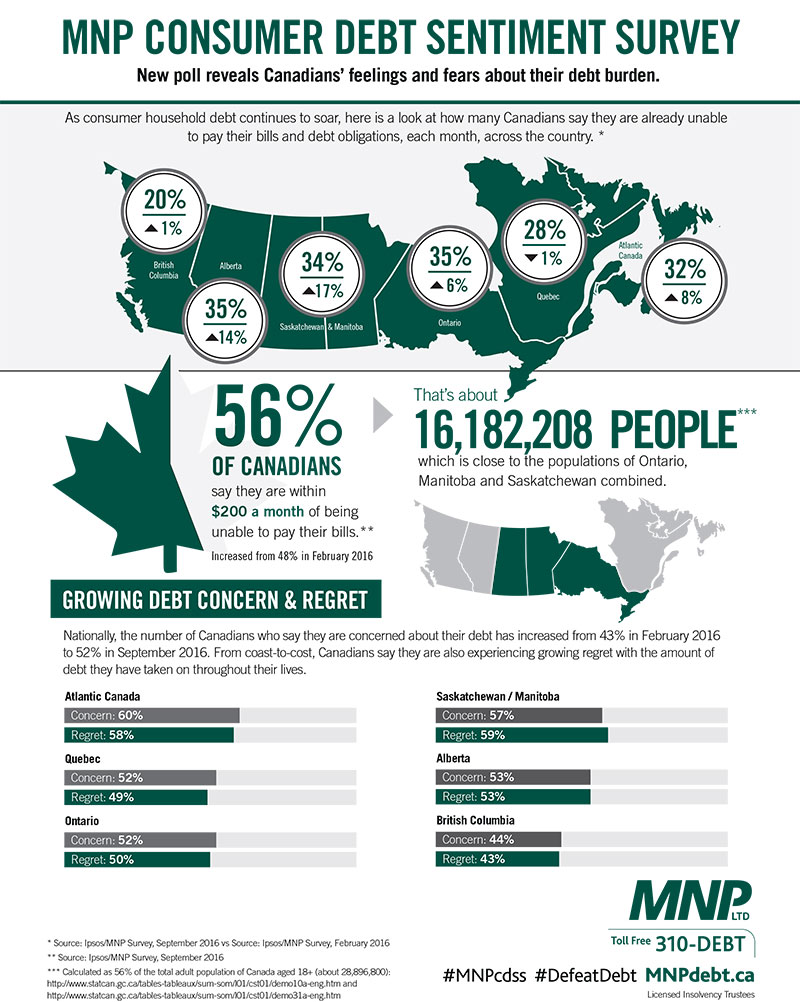Concern About Debt And Potential Interest Rate Hikes Rising Among British Columbians
MNP Consumer Debt Sentiment Survey reveals:
- Forty-seven per cent say they are within $200 a month of being unable to pay their bills and debt payments (up 7 points since February).
- Thirty-four per cent are concerned a rise in interest rates could move them towards bankruptcy (up 14 points since February).
- One in four are concerned about their current level of debt (up 8 points since February).
- Forty-three per cent regret the amount of debt they have taken on (up 6 points since February).
Vancouver, BC – As low borrowing costs and surging real estate prices continue to prop up consumer debt levels in British Columbia, an increasing number of people in the province are feeling concerned about their debt.

The MNP Consumer Debt Sentiment Survey revealed that forty-four per cent of British Columbians say they are concerned about their current level of debt, up eight points since February 2016. For many, this is prompting some soul-searching, with forty-three per cent now indicating that they regret the amount of debt that they have taken on.
“Many over have extended themselves, jumping into the hot housing market, worrying prices would continue to rise if they didn’t. Others feel like they had a lot of equity built up in their homes so they can spend more and use credit to finance their lifestyles. Now the sudden cooling of the market and looking ahead to the possibility of interest rate hikes puts many in potentially disastrous financial situations,” explains Judy Scott, a Vancouver-based government Licensed Insolvency Trustee at MNP Debt.
Concern about the potential for rising interest rates is also rising among those living in B.C. Thirty-four per cent say they are concerned that an increase in interest rates could move them towards bankruptcy, compared to only twenty per cent back in February 2016. This represents one of the largest jumps in the country.
Almost half (47 per cent) of British Columbians now say they are $200 or less per month away from not being able to meet all of their bills or debt obligations each month. That number represents a seven point increase since February 2016 and includes 20 per cent who say they already don’t make enough money to cover their bills and repayment obligations.
“With so many already feeling unable to cover their bills and debts, there is tremendous vulnerability to any kind of economic shock — the loss of a job, an emergency, a divorce, even things like a reduction in overtime pay or bonuses — and especially an increase in interest rates,” said Scott.
Despite the anxiety around debt, over-spending remains a reality. Thirty-four per cent of parents in British Columbia said they spent more than budgeted on back-to-school shopping for their kids, while twenty-six per cent ‘agree’ they spent over budget on recreation or vacations during the summer.

“We cannot continue adjusting to a lifestyle where debt is used for things like new technology and vacations. Bottom line: if you are living on credit, you should seek professional financial guidance right away. One of the biggest mistakes people make is waiting until the point of devastation before getting help,” said Scott.
Other key poll highlights include:
- Fifty-six per cent of Canadians now say they are $200 or less per month away from not being able to meet all of their bills or debt obligations each month, including 31 per cent who say they already don’t make enough money to cover them, technically making them financially insolvent. The proportion of Canadians who say they can’t pay their bills is up 5 points since early 2016 and 10 points since February 2015.
- The concern about the potential for rising interest rates has increased among Canadians. Thirty-eight per cent say they are concerned an increase in interest rates could move them towards bankruptcy, compared to only thirty-one per cent back in February 2016.
- Parents are more likely to be concerned about their debt situation than other Canadians: six in ten (60 per cent) parents are concerned with their level of debt.
- Debt concerns are also much stronger among middle-aged Canadians; six in ten (60%) Gen Xers are concerned about their debt situation, compared to 52% of Millennials and 43% of Baby Boomers.
- Concern about debt is strongest in the Atlantic provinces where 60 per cent worry about their current debt load, compared with 57 per cent of those in Saskatchewan and Manitoba, 53 per cent in Alberta, 52 per cent in Ontario, 52 per cent in Quebec, and 44 per cent in BC.
- Feelings of regret about debt are most present in Saskatchewan and Manitoba (59 per cent), followed closely by the Atlantic Provinces (58 per cent), Alberta (53 per cent), Ontario (50 per cent), Quebec (49 per cent) and BC (43 per cent).
- In Alberta there was an eighteen point increase in the number of residents who said they are $200 or less per month away from not being able to meet their bills each month. That represented the largest jump across the country followed closely by Saskatchewan and Manitoba (17 per cent).
- Residents of Ontario (35 per cent) and Alberta (35 per cent) are the most likely to describe themselves as financially insolvent, followed closely by Saskatchewan and Manitoba (34 per cent), the Atlantic provinces (32 per cent), Quebec (28 per cent) and BC (20 per cent).
About MNP Debt
MNP LTD, a division of MNP LLP, is one of the largest personal insolvency practices in Canada. For more than 50 years, our experienced team of Licensed Insolvency Trustees and advisors have been working collaboratively with individuals to help them recover from times of financial distress and regain control of their finances. With more than 200 Canadian offices from coast-to-coast, MNP helps thousands of Canadians each year who are struggling with an overwhelming amount of debt. Visit www.MNPdebt.ca to learn more.
About the MNP Consumer Debt Sentiment Survey
Now in its second year, the MNP Consumer Debt Sentiment Survey is a semi-annual poll designed to track Canadians’ feelings about their debt and their perception of their ability to meet their monthly payment obligations.
The survey was conducted by Ipsos on behalf of MNP Debt between September 6 and September 12, 2016. For this survey, a sample of 1,502 Canadians from Ipsos' online panel was interviewed online. Weighting was then employed to balance demographics to ensure that the sample's composition reflects that of the adult population according to Census data and to provide results intended to approximate the sample universe. The precision of Ipsos online polls is measured using a credibility interval. In this case, the poll is accurate to within +/ - 2.9 percentage points, 19 times out of 20, had all Canadian adults been polled. The credibility interval will be wider among subsets of the population.

